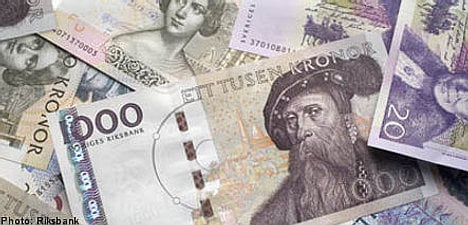Sweden’s economy grew 1.2 percent in the fourth quarter of 2010 compared to the previous three-month period and jumped 7.3 percent year-on-year, beating analyst expectations, according to numbers from Statistics Sweden.
The 7.3-percent year-on-year quarterly jump is the highest on record since the statistics agency started recording quarterly data in 1970.
For the whole year, “GDP (gross domestic product) increased 5.5 percent compared with 2009, which is the highest increase since 1970,” the agency said in a statement.
Sweden’s GDP growth slowed compared to the third quarter, when it reached 2.1 percent, but still outstripped analyst forecasts polled by Dow Jones Newswires for a 0.9-percent quarter-on-quarter gain.
Compared to the same quarter a year earlier, growth sped up to 7.3 percent from 6.9 percent in the third quarter, easily beating analyst expectations that growth would remain a 6.9 percent in the last three months of the year.
Compared to the previous quarter, growth in the October-December period was boosted by household consumption, which was up 4.3 percent, and by investments, which were up 4.5 percent, the statistics agency said.
Sweden, which emerged from recession in the second quarter of 2009 and saw growth quickly pick up in the first quarter of 2010 — largely thanks to a rebound in exports — now has one of Europe’s strongest growth rates.
“The Swedish economy is growing across the board. The recovery is continuing with positive signals from the labour market. This means the central bank will continue to raise its (interest) rates,” Nordea Bank analyst Annika Winsth told news agency TT.
Sweden’s central bank last month hiked its key interest rate for the fifth time since July, a widely anticipated move, bringing it to 1.5 percent.
The bank explained the hike was due to continued growth in the Swedish economy and that it expected its key rate to reach 2.5 percent in 2012, up from the 2.2 percent previously expected.
The head economist of mortgage lender SBAB said Tuesday’s figures confirmed the Riksbank had taken the right monetary policy line.
“The Swedish economy is booming!” Tomas Pousette told TT.
Finance Minister Anders Borg, who has referred to the country’s economy as a “Tiger,” shared analysts’ enthusiasm but said challenges lay ahead.
“There is a substantial challenge ahead of us to manage both strong growth and low unemployment without creating imbalances,” he told TT, saying growth of 5.5 percent in 2010 had beaten the government’s expectations.
Sweden’s unemployment rate, however, rose more than expected in January to 8.2 percent from 7.4 percent in December, but is following a downward trend annually.
In a report published in January, the Organisation for Economic Co-operation and Development (OECD) also said Sweden’s economy would continue to show strong growth this year and in 2012 after emerging relatively unscathed from the global slump.
The OECD put Swedish growth at 3.9 percent this year and 3.4 percent in 2012.



 Please whitelist us to continue reading.
Please whitelist us to continue reading.
Member comments